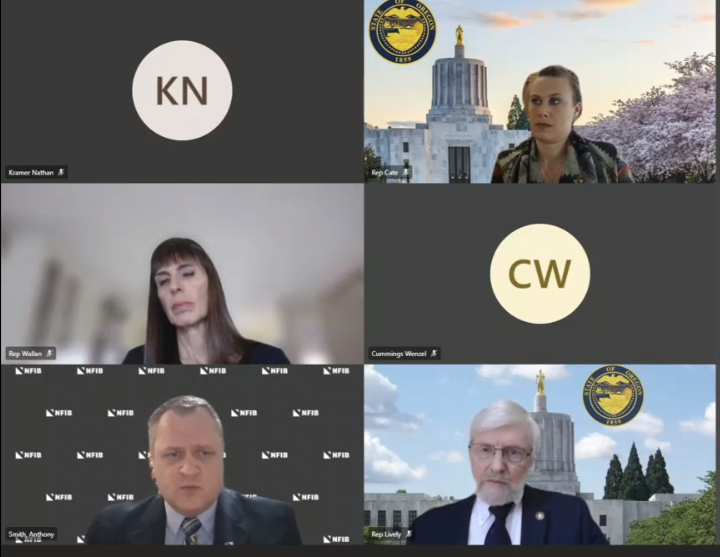March 12, 2021
Will Oregon Deputize all Attorneys to Sue Small Businesses at Will?
State Director Anthony Smith reports from Salem on the small-business agenda for the legislative and political week ending March 12
It’s Day 53 of the 160-day Oregon Legislative Session and small businesses have fared relatively well for the last two weeks. No major tax bills have advanced in the House or the Senate and NFIB has had the opportunity to testify in support of several measures.
The good news is likely to be short-lived. A number of bad bills are up for public hearings and work sessions next week, as the next major legislative deadline approaches quickly. Bills that have been assigned to policy committees must be posted for work sessions by Friday, March 19 to stay alive. Joint Committees, the Rules Committees, and the Revenue Committees are exempt from this rule, but hundreds of bills are likely to meet their demise. During a work session, a bill can be amended, moved to another committee, or passed out of committee and moved to the floor for a vote.
Very few bills have received floor votes in the House and Senate so far – and none of them have been bills that NFIB has actively supported or opposed. Here are the quick highlights of some of the bills we’ve weighed-in on recently, with more information below on each topic:
- Estate Tax Reform: NFIB testified in favor of SB 15, which would increase Oregon’s estate tax exemption threshold from $1 million to $2.5 million. The increased exemption would protect many more small business families from having to pay one of Oregon’s most egregious taxes.
- Small Business Impact Statements: Agencies are supposed to analyze the impacts of proposed rules and regulations before they are adopted and mitigate those impacts to the extent possible. They rarely comply with this requirement, treating it more like a box to be checked. HB 2334 would go a long way in fixing this problem. NFIB testified in support of the bill.
- Labor & Legal Issues: The Private Attorneys General Act (PAGA) appears to be moving forward in the House. HB 2205 is scheduled for a work session on Wednesday, March 17. NFIB testified in opposition to this bill back on February 24. Several other concerning bills are scheduled for public hearings next week as well.
Estate Tax Reform
Eighty-eight percent of NFIB members in Oregon support the complete elimination of Oregon’s estate tax. SB 15 takes a different approach, but it’s a step in the right direction and hopefully, the beginning of a thoughtful dialogue on the subject of estate taxes.
Oregon’s estate tax currently applies to all estates valued at $1 million or more. The tax rates range from 10 percent to 16 percent on the value of the estate that exceeds $1 million. In contrast, the federal estate tax exemption level is currently $11.7 million. Three-fourths of states do not impose an estate tax or inheritance tax at all. Only the state of Massachusetts has exemption threshold as low as Oregon’s at $1 million. As a comparison, our neighboring states of California, Idaho and Nevada do not impose estate taxes. Washington does, but its exemption threshold is more than two-times Oregon’s at $2.193 million.
SB 15 creates an additional exemption for estates valued between $1 million and $8.5 million, with those on the higher end of the scale receiving progressively less of a benefit than those with lower values. No estates would pay more in taxes under this bill – and estates valued at $2.5 million or less would owe no tax.
We need to have a meaningful conversation about estate tax reform in Oregon before we see more and more middle-class families caught up in an estate tax situation they may not be prepared for – or perhaps even worse, if lifelong Oregonians decide to leave the state, which most certainly has a negative impact on state revenues and our economy.
NFIB testified in support of this measure on March 10 before the Senate Committee on Finance and Revenue. It’s too soon to know whether this bill has a chance this session, but because it’s currently assigned to one of the revenue committees, it is not subject to any bill deadlines.
Small Business Impact Statements
NFIB testified in support of HB 2334 on March 11 before the House Committee on Economic Recovery and Prosperity. This is a bill that would strengthen Oregon’s agency rulemaking laws by providing additional clarity regarding the criteria agencies use when conducting a statement of cost compliance effect on small businesses.
Under current law, agencies must conduct an analysis to determine how small businesses will be impacted by proposed permanent rules. Temporary rules are exempt from this requirement. HB 2334 would fix that – which is very important considering that temporary rules often serve as the starting point for the permanent rulemaking process.
Another issue we identified with the way current law is set up relates to the requirement for agencies to reduce the economic impact of the proposed rule on small businesses if the statement of cost compliance effect shows that the rule has a significant adverse effect on small businesses. Agencies rarely ever comply with this requirement, so HB 2334 proposes to move this section of current law into another section of the law that agencies generally do comply with.
This simple change should ensure that Oregon’s agencies fully and consistently consider, and appropriately mitigate, the costs imposed by proposed agency rules as a formal part of the administrative rulemaking process going forward.
HB 2334 is subject to policy committee deadlines, but we were able to meet with the chair of the committee after the hearing and he has already posted a work session for this bill to occur on Thursday, March 18. This effectively keeps the bill alive until the next major deadline on Tuesday, April 13. This is the deadline by which bills in policy committees must be voted out to the floor, or to one of the committees not subject to the deadlines.
Labor & Legal Issues
A quick “thank you” is in order to NFIB members that took action on HB 2205 and HB 2638, but we still have work to do on these bills!
HB 2205, the Private Attorneys General Act (PAGA) has been scheduled for a work session on Wednesday, March 17. This is the bill that would allow individuals (and their own attorneys) the right to sue private businesses in the name of the state for things like OSHA violations and wage claims.
And unfortunately, HB 2638, which is the bill that would provide COVID-19 liability protections for businesses that are in compliance with state and federal health and safety guidance, is in jeopardy of not moving forward if the bill isn’t scheduled for a work session before the March 19 deadline.
If you haven’t done so already, it’s not too late to TAKE ACTION to oppose HB 2205 and support HB 2638!
Here are a few more bills scheduled for public hearings that NFIB is watching with concern – and will likely weigh-in on. Bill sponsors are noted by parentheses:
- HB 2474 (Power): Expands applicability of certain provisions relating to family leave to employers who employ one or more employees. Includes closure of child care provider or school due to public health emergency as qualifying purpose for which leave may be taken. Reduces amount of time employee must work for employer before becoming eligible to take leave. Eliminates disciplinary action that may be imposed upon employee for employee’s failure to comply with leave notice requirements. Allows employee to determine order in which employee may choose to use accrued leave.
- HB 3188 (House Business & Labor Committee, Holvey): Changes definitions of “employer” and “worker” for purposes of workers’ compensation law.
- HB2420 (Holvey): Extends timeline for filing complaint with Commissioner of Bureau of Labor and Industries alleging retaliation or discrimination for reporting unlawful practices or exercising certain rights relating to safety and health in workplace.
- SB 483 (Taylor, Dembrow, Gelser Manning, Jr.): Creates rebuttable presumption that person violated prohibition against retaliation or discrimination against employee or prospective employee if person takes certain action against employee or prospective employee within 60 days after employee or prospective employee has engaged in certain protected activities. Provides that employee or prospective employee bears burden of proof when person takes certain action against employee or prospective employee more than 60 days after employee or prospective employee has engaged in protected activities. Declares emergency, effective on passage.
Previous Reports and Related News

NFIB is a member-driven organization advocating on behalf of small and independent businesses nationwide.
Related Articles


















